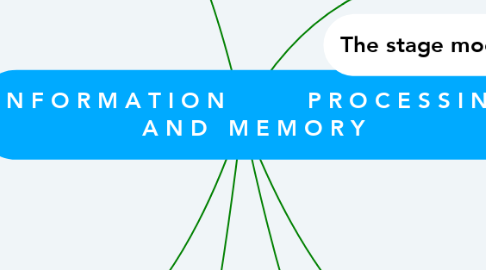I N F O R M A T I O N P R O C E S S I N G A N D M E M O R Y
by araujsol xo

1. Other Theories of Information Processing
1.1. Levels of processing.
1.2. Dual Coding Theory
1.3. Schema theory, parallel distributed processing, and connectionist models.
2. Development of Memory and Information Processing
2.1. 1. Brain changes brought about by biological maturation or experience; 2. Increased processing capacity, speed, and efficiency as a result of both maturation and knowledge development; 3. Modifications of connections in a neural network; 4. New emergent concepts arising from repeated self-organization as a result of adapting to the demands of a changing environment; and 5. Increased capacity for problem-solving and metacognition
3. Encoding
3.1. Encoding occurs during the initial processing of a stimulus or event. Maturation and experience influence this process.
4. Structuring and Organizing
4.1. Structuring and organizing information occur as the learner processes and stores information. The learner’s ability changes over time as a result of both maturation and experience.
5. memory is the combined total of all mental experiences.
6. The stage model
6.1. recognizes three types or stages of memory: sensory memory, short-term or working memory, and long-term memory.
7. Designing Instruction that Incorporates Best Practices for Information Processing
7.1. The understanding of how the mind processes and stores information is invaluable to educators as they plan for instruction.
8. Summary and Conclusions
8.1. elaboration is a key to permanently storing information in a way that facilitates its quick retrieval when it is needed


